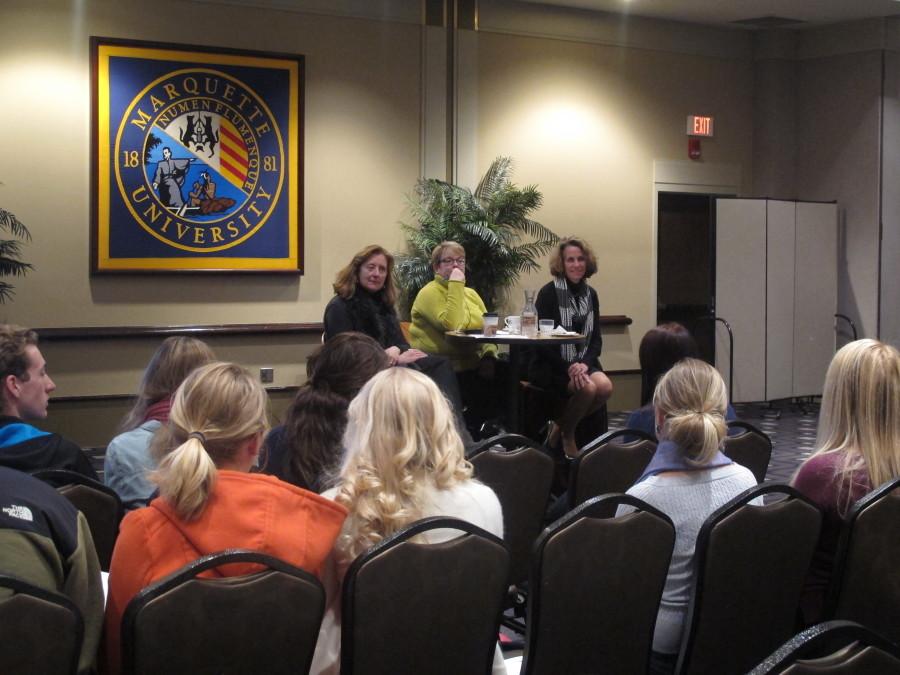Gender, religious affiliation and fundraising were a few topics discussed at the Marquette Student Government-hosted presidential student input session Wednesday.
Kristina Ropella, executive associate dean in the College of Engineering, led the input session with Board of Trustee member Janis Orlowski and Stephanie Quade, dean of students in the Office of Student Development. Quade said the student input session is important because in the end, students are the customer for the search.
“(Students) are the people that sit in the classroom and (students) are the ones that pay tuition,” Quade said. “There was a reason you chose this institution, and we want to find someone who personifies those reasons. So I think student opinions on what they think pressing matters are and what they think we should be looking for are important.”
The 27 students who attended the session were from all different colleges and class standing.
Students were asked to share one characteristic they thought was most important. Some of the words included kind, driven, aware, diverse, empathetic, leadership and charismatic.
One word that was repeated multiple times was “woman.”
Gina DiVittorio, a freshman in the College of Arts & Sciences, said Marquette was the first Catholic university to have co-education courses, and that we should keep with this tradition.
“That is a Jesuit thing, but it is also a Marquette thing, so I think that going along with what is being resounded here, I think it would be a good step for us to take if we do have the opportunity to take and everything lines both on their behalf and our behalf,” DiVittorio said. “And I do think a woman might bring new characteristics to the role of the president.”
Cormac Brown, a freshman in the College of Arts & Sciences, agreed to an extent.
“I think having a woman as president is great, but I think the values of the president are more important,” Brown said. “If a woman has the values, that would be great.”
In addition to gender, another debate about the characteristics for the next president is whether or not the next president will be a layperson or a Jesuit. Orlowski said the bylaws were changed during the last presidential search to include lay candidates. Candidates, however, still have to be Catholic.
Lukas Baker, a junior in the College of Communication, said he agrees with the idea that the president should be Catholic; however, he thinks the selection should be a priest.
“Personally for me, I want to see possibly a priest,” Baker said. “I am very happy that the bylaw stands that it has to be Catholic because I believe that is a strong must for Marquette. But on the note, I don’t necessarily think it has to be a Jesuit, but I think it should be a priest again.”
In the past few years, over half of all Jesuit institutions changed their bylaws to allow lay people to lead the university, according to the Association of Jesuit Colleges and Universities. John Ferraro, chairman of the presidential search committee and member of the Board of Trustees, said during an interview with the Tribune last Wednesday that a main reason for the bylaw change is to increase the size of the candidate pool.
Kristen Steinfeld, a senior in the College of Business Administration, said she thinks increasing the candidate pool will allow for one very important characteristic to come forward: business ingenuity.
“I think that the pool of Jesuits that I am aware of probably isn’t that large, I think we really do need to consider a lay person who is business savvy because that is one thing that we as a university needs,” Steinfeld said. “Having someone who is Catholic is an important thing to state, but not everyone is gungho or needing it to be a Jesuit. First and foremost, I think we need to make Marquette the best that it can be and one of the ways (to do this) is the acquisition of money.”
Financial concerns were another important topic covered during the session.
“When Pilarz entered office, he made a commitment that he was going to work to lower costs,” said Brittany Riesenbeck, a senior in the College of Business Administration. “For awhile the increase was at 4.5 percent, and with tuition increasing each year, it has become difficult for many students to stay.”
Orlowski agreed.
“And if you take a look at Marquette, we do not have a significant endowment, and as a private institution, we have a high tuition,” she said. “I know we do because I have paid it, and it is a big payment. So the question is how do we deal with the endowment.”
Orlowski said a compilation of themes heard during the listening session will be submitted to the search committee in early December. During the first quarter of next semester, Witt/Kieffer, the search firm selected to aid in the search, will begin looking for candidates that fit these qualifications and attributes. The committee will interview candidates, and it hopes to have a decision by the end of the academic year.

